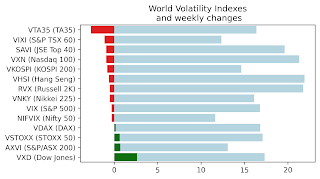While uncertainly in Egypt may have been an excuse for volatility rise last week, we see that market discounted it as a non-event. Even now with more recent news about gas pipeline explosion, would probably not be a catalyst for higher volatility. Long-term futures tell us unambiguously that we're still in the low-volatility regime.
One of the reasons for such fall in volatility can be falling correlations. After the crisis in 2008 we've seen a spike in correlation among all asset classes, what became colloquially known as risk on / risk off. Lately that pattern started to wane. For example KCJ implied correlation index closed near a 6-month low (chart) Looking at historical charts of ICJ, JCJ, KCJ it looks like implied correlation will likely not to go much lower, and that is probably going to have a negative effect on VIX skew.





No comments:
Post a Comment